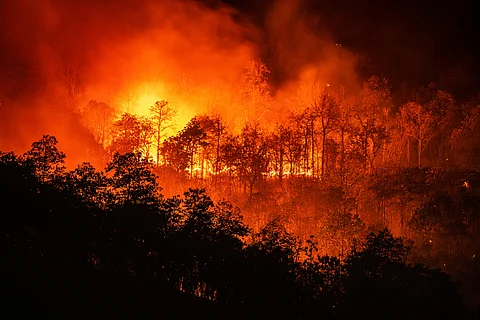

Every year, approximately 34 million to 37 million hectares of forested land gets incinerated due to wildfires. This loss of forests is comparable to land spread across 68 million football fields. Also, the incidence of forest fires could increase by 50 per cent by the end of the century.
The Food and Agriculture Organization (FAO) of the United Nations has expressed concern and has issued guidelines for managing these fires.
In a press statement issued on July 30, the FAO stated that in the future, climate change will lead to increased drought, rising temperatures, and stronger winds.
This will not only increase the severity of fires but also raise the likelihood of fires persisting for longer periods. As a result, by the end of the century, extreme fire events in forests could increase by approximately 50 per cent.
According to the FAO, when forest fires become severe, they can also impact sustainable development. For example, they can endanger the livelihoods of communities and produce large amounts of greenhouse gas emissions.
In the press statement, Jhiming Wu, Director of the FAO Forestry Division, stated, “How we address the challenge of forest fires has become very crucial.”
He also launched the new version of the guidelines during the 9th World Forest Week in Rome.
The new guidelines give equal importance to both scientific approaches and traditional knowledge in addressing forest fires. They also emphasise that action must be taken well before a fire starts, during the fire, and long after it has been extinguished.
The FAO has recommended that countries use the traditional knowledge of local communities living in or around forests to guide strategic actions and decision-making for fire management.
The UN body also stated that active involvement of local people must be ensured to prevent forest fires, quickly suppress outbreaks, and restore areas severely damaged by burning. The FAO's guidelines advocate for the inclusion of women's roles, promoting diverse fire knowledge, and exploring new alternatives.
The last time FAO issued guidelines for forest fire management was nearly 20 years ago.
It is claimed that many countries around the world have used these guidelines to develop public policies and training programmes.
These guidelines represent the first activity of the Global Fire Management Hub, which was launched in 2023 by the FAO and the United Nations Environment Programme (UNEP). The purpose of this Fire Hub is to unite the global fire management community and enhance national capacities for implementing integrated fire management strategies.
The Fire Hub is supported by the governments of Canada, France, Germany, Portugal, South Korea, and the United States, and has received funding of $5 million to date.
This funding comes from key partners who have played a significant role in the development of the Fire Hub. These include the Canadian Forest Service, the German Federal Ministry of Food and Agriculture, the Korean Forest Service through the Integrated Risk Management (AFFIRM) mechanism, the Portuguese Agency for Integrated Rural Fire Management, as well as the U.S. Forest Service and USAID.